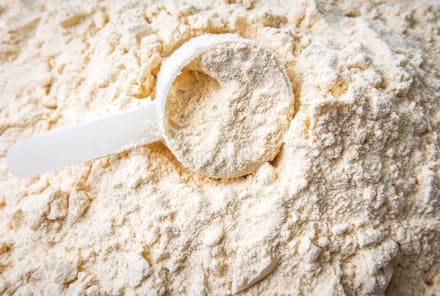Advertisement
Dealing With SIBO? Don't Make One Of These 5 Common Mistakes

So, your small intestinal bacterial overgrowth (SIBO) test result is back, and it's positive. You're likely relieved—because you finally have a diagnosis that explains your symptoms, like bloating, gas, constipation, or diarrhea—but you're also concerned because SIBO can be stubborn to eradicate.
The road to healing from SIBO isn't always a straight line, so as you work with your health care provider, avoid these five mistakes to boost your treatment success and prevent SIBO from recurring:
1. Not following a SIBO-appropriate diet and eating pattern.
Diet is part of the treatment, and carbohydrates feed bacteria, so it goes without saying that sugars from sweets, breads, pastries, soda, juices, alcohol, and others are not your best friends. Healthy carbohydrates in excess, or the wrong types of carbohydrates, can slow down your healing process as well. Some people can't tolerate simple sugars like lactose and fructose while others have a hard time with complex starches like potatoes and rice.
There's no one diet that works for everyone with SIBO, so it's important to identify which carbohydrates you can't digest and absorb because those are the ones that end up getting fermented by your small intestine bacteria. Depending on my patient's symptoms and medical history, I may use the low FODMAPs, Specific Carbohydrate Diet (SCD), SIBO-Specific (combines the low FODMAPs and SCD), or the Fast Tract Diet. Avoid fiber early in the treatment. Ultimately, your goal is to eradicate SIBO so you can reintroduce healthy foods that some of these diets restrict like garlic, onion, and apple.
Timing your meals is also important. The migrating motor complex (MMC) is a wave of contractions1 that starts in the stomach and goes through the small intestine, and interruptions in MMC increase the risk of SIBO2. Think of the MMC as "housekeeping"; it sweeps bacteria and undigested food and dumps them into the large intestine. The MMC needs 90 to 120 minutes to complete this job2, but it gets stopped and has to reset every time you eat. If you take more than an hour to nibble on meals because you're too distracted or because you think it's healthier, or if you eat every two hours or less, you're interfering with your MMC. Instead of grazing, sit down and eat your meal mindfully, then "close the kitchen" for three to four hours.
2. Not incorporating a motility agent.
Small bowel transit time—also known as the time it takes food to pass through the small intestine—is longer in people with SIBO3. And when food passes slowly, it feeds bacteria and promotes their growth. That's why you should always incorporate motility agents, especially if you have constipation. There are several types of motility medications that you can ask your doctor about. Herbal motility products may contain ginger, vitamin B6, 5-HTP, artichoke leaf extract, and other botanicals. I usually use motility agents with all my SIBO patients—as long as they don't have diarrhea.
What interferes with proper motility? Food poisoning and infectious gastroenteritis with certain bacteria, viruses, or parasites can damage the cells that act as the pacemaker4 and control the MMC. Uncontrolled diabetes has a similar effect, and hypothyroidism, gastroparesis, celiac disease, and Parkinson's disease slow down motility2 as well. To top it off, stress triggers the fight-or-flight response that shuts down digestion.
3. Not retesting to make sure SIBO is gone.
Unfortunately, SIBO can be stubborn to treat, and it can come back. So whether you chose antibiotics or herbals, retest within the first week of completing treatment to confirm that it's gone. If you wait too long, or never retest, and your symptoms come back a few weeks or months down the road, you're back at the starting line. When you confirm that the treatment was successful, you can confidently transition to a maintenance and prevention plan. If you test positive, your practitioner can prescribe a different medication or herbal protocol. Understand that your healing journey may include a plan B or C, or even a plan D, but without retesting, you have too many unknowns. If it turns out that your SIBO is stubborn, ask your provider about the elemental formula diet.
4. Not considering other possible causes for your symptoms.
Having SIBO doesn't rule out other gut infections. You may also have yeast, mold, viruses, parasites, H. Pylori, clostridia, or other bacteria. You may have small intestine fungal overgrowth5 (SIFO). My functional medicine mentors stress the importance of ruling out H. Pylori and obtaining a thorough assessment of the colon, whether SIBO is positive or not. If your SIBO retest is negative but you continue to experience symptoms, search for other sources of gut dysbiosis and infections.
5. Not searching for your SIBO root causes.
Extra bacteria in your intestine? Blast them with antibiotics and your job is done, right? Not so much. Treating SIBO by shooting just one arrow at the target doesn't work. Replacing antibiotics with herbals isn't integrative enough. To completely heal and prevent recurring SIBO, you must understand why it happened in the first place. In addition to slow motility, low gastric acid (or high stomach pH), a weakened immune system, reduced pressure at the ileocecal junction3 (the muscles that separate the large from the small intestine), and dysbiosis in the large intestine can cause SIBO2. That's why, along with killing bacteria, your treatment must aim to:
Improve gut motility.
You can do this by including motility agents and addressing the root cause of slow gut transit if at all possible.
Maintain adequate stomach acid.
Include betaine HCL if tolerated. If taking acid-lowering medications, discuss weaning off with your doctor. Treating SIBO may reduce your heartburn and reflux.
Boost digestion with supplements and herbs.
Incorporate digestive enzymes, bile, and digestive bitters. The ability of your intestine cells to produce brush border enzymes on their own should start to improve as SIBO clears
Repopulate the large intestine with good microbes.
As I mentioned before, treating SIBO can be a process, and you have to be ready to test, retest, and adapt your treatment plan as you go. The good news is that by avoiding these five mistakes, you can save yourself time and, hopefully, set yourself on a quicker path to healing your gut for good.
Watch Next
Enjoy some of our favorite clips from classes
Enjoy some of our favorite clips from classes
What Is Meditation?
Mindfulness/Spirituality | Light Watkins
Box Breathing
Mindfulness/Spirituality | Gwen Dittmar
What Breathwork Can Address
Mindfulness/Spirituality | Gwen Dittmar
The 8 Limbs of Yoga - What is Asana?
Yoga | Caley Alyssa
Two Standing Postures to Open Up Tight Hips
Yoga | Caley Alyssa
How Plants Can Optimize Athletic Performance
Nutrition | Rich Roll
What to Eat Before a Workout
Nutrition | Rich Roll
How Ayurveda Helps Us Navigate Modern Life
Nutrition | Sahara Rose
Messages About Love & Relationships
Love & Relationships | Esther Perel
Love Languages
Love & Relationships | Esther Perel


















